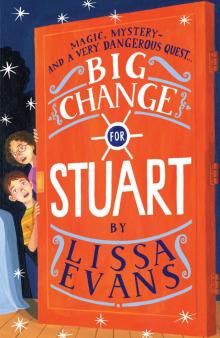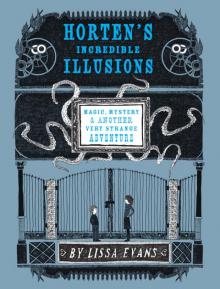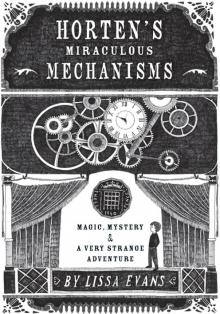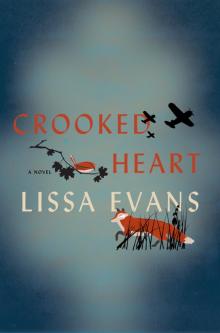- Home
- Lissa Evans
Crooked Heart Page 11
Crooked Heart Read online
Page 11
‘What about you?’
‘—he said, “Because I’ve heard tarts go for the uniform,”’ finished Win, determinedly. ‘I’m reserved, aren’t I?’
‘I thought you worked at the barber’s.’
‘Joined the specials in March, and they’re taking me on permanent. The station sergeant called me into his office and said, “How would you like to join the force permanent?” and I said, “I only joined the specials in March,” but he said it’s all the fifth columnists, the country’s chocka with spies, they need more police on the lookout and I’m just the sort they want. I arrested two enemy aliens last month.’
‘What happened?’ asked Donald, curious in spite of himself.
‘I was proceeding westward from the Market Cross when I heard two women talking in a foreign tongue behind Waterend Barn about ten forty-five at night – you know, the place where they have the weekend dances?’ Donald nodded, and Win carried on reading from his imaginary police notebook. ‘I stopped them and inspected their identity cards. On discovering they were registered enemy aliens, I pointed out to them that it was an offence for them to be absent from their registered addresses after ten thirty p.m. A week later, they appeared before the Bench charged with an offence under the Aliens’ Movement (Restriction) Order 1940. Each was fined five pounds. Matter of fact,’ added Win, leaning forward and speaking conspira torially, though it was hard to hear him through the din, ‘they were here in the Bull this evening, on the other side of the lounge bar. One of them’s a bit of all right. Blonde.’
‘So they’re not spies?’
‘They’re not.’
‘Who is, then?’
‘Oh no, you won’t get me like that,’ said Win, as if evading an elaborate and cunning ambush. ‘The girls said the same thing to me that night, they said, “We’re not spies,” and I said, “I’m not saying you’re spies, I’m saying you’re absent from your registered address after ten thirty p.m. at night, which is an offence under the—”’
Having reloaded, he rattled on. Over by the bar, somebody dropped a glass and there was a cheer and a surge of khaki.
‘All over my fooking boots, you fooking fooker!’ bellowed a northern voice.
Donald glanced around, clocking the faces. It was ridiculous, he knew, but he kept expecting to bump into that bastard Fielding, now in uniform and thirsting for further vengeance. The worry of it had kept him at home, long after he could have resumed his career; he’d had a few offers, sent on from the old address. There was one that had come only today in a cream envelope, lined with maroon tissue, the paper watermarked, the handwriting beautiful, dark violet ink, a flowing purple filigree across the page. I am writing to enquire about your availability on the morning of Thursday, 29th October in Kensington, London, for a task for which I believe you are heartily qualified.
There’d been no mention of money in the letter, but the writer had used the phrase ‘mutually agreeable arrangement’, which Donald sensed might be an opportunity to raise his rate again. The 1904s were being called up now, which meant that the letter-writer would probably be well into his thirties, someone with a substantial career and cash to spare. ‘JD’ he’d signed it. It would be a gentlemanly sort of name. Jasper. Jolyon. Bespoke suits. Gold cufflinks. A house with a basement and a bell-pull and a hall floor like a marble draughts board. Mr Sedge Esquire? Do come in. Tea in cups that matched, served on a table whose legs were all the same length.
He had almost written to accept, but couldn’t dispel a nudging nervousness at the prospect of travelling into London. Aside from the bombs, he didn’t know his way around. He’d never even been on the underground and Londoners were sharp, on the lookout for country types; he wanted to appear worldly and smooth and was afraid he’d arrive on the doorstep of JD’s house two hours late and robbed blind.
He’d never been taught anything useful, he thought, bitterly. School had wasted him, had never considered that a man might want a wider life. Sums on slates and rows of pot-hooks, a fortnight off for the harvest every year, and here he was at nineteen, afraid to visit his own capital city. One day he’d take taxis everywhere, or have a Bentley with a chauffeur in a pearl-grey uniform and white gloves . . .
‘Pardon,’ said Win, over a noise like a burst tyre, and Donald found himself back in the world of farts and cider, the taste of gingerless ginger ale sickly on his tongue.
‘Here, I haven’t told you about the burglar what keeps stealing fruit off people,’ said Win. ‘The sarge called me in to his office and he said, “You won’t guess what this chap keeps nicking,” and I said, “I’m no good at guessing, Sarge, you’ll have to tell me,” and he said, “Fruit,” and I said, “You’re having me on,” and he said, “I’m dead serious, he steals fruit.”’ He drained his glass. ‘Another one?’
Donald shook his head. ‘No, I’m off.’ He left half the drink and pushed his way to the door.
It was moonless, as dark as if someone had thrown a black cloth over the town. Donald waited for a few seconds, and saw a white line emerge gradually from beneath his feet and slide into the night: the painted stripe that marked the edge of the pavement. He switched on his torch, aimed the faint splash of light a yard or two ahead and started to walk slowly, one arm extended to fend off lamp-posts. The town lost all familiarity in the blackout; distances stretched, a hundred yards seemed half a mile, turnings disappeared or multiplied.
He crossed the road by the Co-op, and nearly got his nose sliced off by an invisible bicycle flying along in the centre of the road, and then he stumbled over a sandbag on the opposite pavement, flung out an arm and hit something that screamed.
‘Sorry.’
‘You haff a torch?’ A hand clutched his arm, and the light jerked up to reveal red lips and a long white face, blonde hair curling to the shoulders, a humming-bird brooch on the coat lapel. ‘Can we borrow you? We haff flad badderies.’
‘Where are you heading to?’
‘Not far. What is your name?’
‘Donald.’
‘Duck!’ she shrieked, her voice splintering off into giggles. ‘My name is Birgit and I must warn you I haff to hurry home because I am an alien.’
She leaned in to whisper the last word, and her brooch speared him in the neck with its beak.
‘I was just talking to someone about you,’ he said, swaying back.
She looked delighted. ‘Is it true?’
‘A local policeman.’
‘Oh yes, he was very, very cruel.’ Despite this, she sounded buoyant. ‘So many people are suspicious and yet every day I’m in the factory, working and working for the war effort. I haff a great big machine and I swivel, punch, lift, swivel, punch. I am getting very strong – like you,’ she added, and gave Donald’s bicep a squeeze. ‘Where do you live?’
‘The end of this road.’
‘And we are at the hostel by Brickett Wood Common. It’s very kind of you to walk with us, Mr Duck, with your great big torch!’
‘Brickett Wood? That’s back the other way.’
‘Is it?’
‘You’ve gone a quarter-mile in the wrong direction.’
‘I tolt you,’ muttered a voice from behind. Donald looked round but could see nothing but a shape in the darkness, a pale blob beneath a knitted tam.
‘I am such a silly goose!’ said Birgit, brightly. ‘Right and left and left and right are not my friends and they neffer will be my friends! In fact, they are my enemies! War on left and right and right and left!’ Her voice was very loud. ‘And now we will haff to hurry. Come on, Mr Duck!’
‘Warum musst du immer so schreien?’ asked the voice from behind.
‘No,’ said Birgit, ‘I am not always shouting, Hilde, I am speaking clearly because I am a foreigner and I want the English to be able to understand my accent, and not to hear me muddering in German like you do all the time, like a troll. You can understand me, can’t you?’ she asked, tightening her grip on Donald’s arm.
‘Yes. You’re German
then?’
‘No!’ The peal of laughter nearly took his ear off. ‘I hate Germans.’
‘Austrian,’ said the small voice from behind.
‘But I love the English, and I love the English country and all the lovely birds and flowers, and the beer and cake and the lovely tea.’ Every noun was accompanied by a bounce on the toes and a tug on Donald’s arm; it was like taking a terrier for a walk. ‘If I was English I would fight and fight to keep all the beer and cake and lovely tea.’
‘Österreichischer Kuchen ist viel besser,’ said the small, dark voice.
‘No they are not, Hilde.’
‘Yes they are. Austrian cakes are far bedder than English cakes, they are famous over the world.’
‘You must try to ignore her, Mr Duck, because she is not a very happy or grateful person, and it is my bad luck to be stuck together with her, just because we are aliens. And I try hard to be happy and be a good pal and join in with all the fun!’
‘Sachertorte is not like a jam sponge that anyone can make. People would come all the way from another country to eat Sachertorte.’
‘So are you not in the army, Mr Duck?’
‘My name’s Donald Sedge.’
‘Yes, but Duck is my little joke!’ He flinched away before Birgit could laugh again.
‘I’m in a reserved occupation,’ he said, and the phrase felt perfect in his mouth.
‘What is that?’
‘I can’t talk about it. It’s hush-hush.’
‘Oh, but of course I understand. Loose lips sink ships! Be like Dad keep Mum!’
‘Shud up, Birgit,’ said the voice from behind.
‘Don’t tell me to shud up, please.’
The other girl replied in German, and a hissed argument ensued, Donald’s arm jerking back and forth with every exchange.
‘Left down here and then on the right,’ said Birgit, midharangue. ‘The big house with the tree.’
‘Small house,’ said Hilde, disparagingly.
‘Don’t listen please, Donald. It is very comfortable and pleasant.’
‘The curtains are made of sacking.’
‘We are very grateful to the people of England.’
‘By my house in Wiener Neustadt the kitchen maid had bedder curtains.’
‘I shall sing a song so you can’t hear her voice. Do you know “Can I Forget You”?’
‘This one?’ asked Donald, raising the torch and catching the bottom half of a gatepost, with an old sign reading The Beeches and a newer one advertising it as a hostel for women workers. It occurred to him that he’d heard of it; the place was known locally as ‘The Bitches’.
Birgit disengaged her arm. ‘Thank you so much,’ she said, warmly. ‘It was very, very kind of you to take us all the way home. Wasn’t it, Hilde?’
There was a mutter in reply, drowned by a series of girlish screams from the other side of the road, and the noise of a man pretending to be a lion. Birgit did another of her gay laughs.
‘And now that will be Avis and Pam back from their dance. Avis! Pam! Are you back from your dance? Have you brought a wild beast with you?’
‘Hello, Birgit,’ replied one of the girls, without enthusiasm. ‘Haven’t got a couple of fags, have you? Avis and I are all out – the boys kept pinching ours.’
‘Of course.’
‘Handing out fags?’ asked the lion, jovially. ‘Got one for me? Tell you what, I’ll take one for now and one for later. You don’t mind, do you?’
‘No, no.’
‘And maybe one for the morning – you can spare it, can’t you, for a soldier boy?’
‘Oh yes,’ said Birgit, brightly. ‘I haff plenty.’
‘Getting a secret stash dropped in by the Luftwaffe, are you?’
‘Oh yes, we aliens are kept very well supplied.’
‘In that case, I’ll take a couple more.’
Birgit let out another scream of laughter, and Donald heard a sharp sigh from the darkness next to him.
On impulse, he raised the torch. Birgit’s companion had turned and was walking away, one hand trailing along the panels of the garden fence.
‘Are you all right?’
She turned. She was short and pale, her dark hair scraped back and tucked into her hat. She looked as if she were about to pass out from disgust.
‘I chust cannot listen to this,’ she said. ‘With Birgit everything is funny. The food, the chob, the rudeness of people to us – all is ha ha ha ha ha.’
There was an answering burst of laughter from behind them, Birgit’s shriek a beat or two behind the others.
‘Day after day I have to listen,’ said Hilde. ‘They even put me on the next machine so I would have a frent. Luckily I cannot hear her because of the noise.’
‘I got told this one today,’ said the soldier, over Birgit’s yelps. ‘Might be a touch ripe for the ladies, but here goes. This slip of a tit goes up to the bar and she says to the barman, “Pull us a pint, Charlie,” and he says . . .’
Hilde stood unmoving while the filthy joke unwound, and then, as the punchline slithered past, she raised her eyes and for the first time looked directly at Donald.
‘I should not have to listen to this sort of talk,’ she said. ‘This is not what I am used to. At home we had a pastry cook. I studied the harp.’
Something happened inside Donald’s chest: he felt a gasping heave, like the shudder of a beached fish, and for a moment he thought he must be dying, but his heart pounded onward and Hilde continued to speak, her voice low and emphatic.
‘And they make us share a room. It is filthy. There is a woman who calls herself a cleaner, but you could grow marshrooms in the skirting boarts, she uses the same cloth which also is for the lavatory and I know this to be true because one day I watched her, even though she tried to hide from me. At home the maid would clean the skirting boarts twice a week with lemon chuice and every year they were painted again so they were always fresh. When we arrived at The Beeches I complained about the skirting boarts and the warden was so rude I thought I would have to leave, but of course, there is nowhere to go. We are not welcome anywhere.’
She was looking past Donald’s shoulder, her hands, in crocheted gloves, clasped together as if praying. ‘Sometimes there is so much rudeness that I have to close my eyes and think I am sitting in our summerhouse at Wiener Neustadt, with my skedging book. Skedging.’
There was a flare of light, and Donald turned to see one of the other girls leaning forward over a match, a cigarette between orange lips.
‘Ta everso,’ she said, flapping her eyelids at the soldier.
He looked back at Hilde. It was like switching his gaze from one of his mother’s hat decorations to a real flower. His heart flailed again.
‘What did you sketch?’ he asked, and the voice didn’t sound like his own.
‘Various things. Horses. Clouds. ’
‘And what do you enjoy doing now? In your time off, I mean?’
‘There is nothing that I enchoy doing. My life is horrible.’
‘The pictures?’
‘I went once. There was a stain on the seat and the man beside me was old and disgusting.’
‘Did you sit upstairs or downstairs?’
‘Downstairs.’
‘You get a better class of person upstairs. There are half-crown seats in the circle.’
‘Half-crown?’
‘My treat. When could you go?’
‘Go where?’
‘To the pictures with me. Wednesday evening?’
She looked at him with irritation, as if he’d suggested she work an extra shift at the factory.
‘Oh, Hilde,’ said Birgit, roguishly from the darkness. ‘Are you coming in or do you wish to keep talking?’ She managed to souse the last two syllables with a bucketful of filth.
‘I wish to keep talking,’ said Hilde, restoring the word to instant cleanliness.
With much sniggering, the other girls opened the gate and went up the path. The front
door snapped shut.
‘So what do you want to talk about?’ asked Donald.
‘I don’t. I chust want not to talk to Birgit. If I wait a short time she will be asleep when I get to our room.’
For a full minute there was utter silence. Donald had lowered the torch, and all he could see of Hilde was her feet. They were clad in dainty black Oxfords with tassels on the laces; he had sold many similar pairs in his time at de Souza’s (‘A classic choice, madam. And may I interest you in a pair of shoe trees?’). She had tiny feet – he’d estimate a size 3, double C fitting – and he imagined kneeling before her, while she rested her small heel in the palm of his hand. The thought caused another unexpected throb, lower down this time.
In the darkness, he heard Hilde take something from her handbag.
‘Need a light?’ he asked, quickly feeling for his matches.
‘I am eating a biscuit I have safed from luncheon.’
He heard the soft crunch of it between her teeth, and tried to think of something smoothly fascinating to say. And failed.
‘You like biscuits, do you?’ he asked.
‘Yes.’
‘Any sort in particular?’
‘Vanillekipferl.’
‘Would those be Austrian biscuits?’
‘Yes.’ She coughed on a crumb and he hovered his hand above her back, but didn’t dare touch, didn’t trust himself (for the first time in his life) not to carry on touching.
There was another minute of silence.
‘I will go now,’ said Hilde. ‘Good night.’
‘Come to the pictures on Wednesday.’
‘I am sure Birgit will come to the pictures with you.’
‘I don’t want to go with Birgit.’
‘Why not? She has blonde hair and a figure.’
‘Because she’s common. You’re . . .’ He paused, and then the perfect word came to him. ‘Uncommon.’
There was a short, surprised pause.
‘I know nothing about you,’ said Hilde. ‘I do not even know what you look like.’
Mutely, Donald held out the torch, and she took it and shone it back at him. He tried for a pensive expression, head tilted in thought.

 V for Victory
V for Victory Old Baggage
Old Baggage Wed Wabbit
Wed Wabbit Big Change for Stuart
Big Change for Stuart Spencer's List
Spencer's List Horten's Incredible Illusions
Horten's Incredible Illusions Horten's Miraculous Mechanisms
Horten's Miraculous Mechanisms Their Finest Hour and a Half
Their Finest Hour and a Half Crooked Heart
Crooked Heart